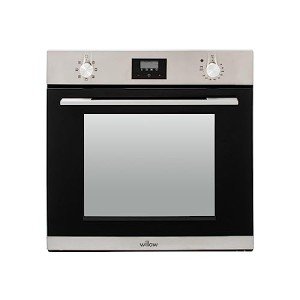See What In Built Oven Tricks The Celebs Are Utilizing
페이지 정보
본문
Understanding In-Built Ovens: A Comprehensive Guide
In the realm of modern-day kitchen design, in-built ovens have actually increased to prominence, blending performance with aesthetics. Their seamless combination into cabinetry supplies a structured appearance, making them increasingly preferred by property owners and culinary enthusiasts alike. This article checks out the various features, advantages, setup factors to consider, integrated hob and oven popular kinds of inbuilt ovens, together with responding to some regularly asked questions.
What is an In-Built Oven?
A built-in oven, typically referred to as a built-in oven, is a kitchen appliance developed to be set up within kitchen cabinetry, instead of as a freestanding unit. This setup permits a more sophisticated and organized kitchen design while optimizing available area. Built-in ovens been available in different sizes, styles, and functionalities to match various cooking requirements and choices.
Advantages of In-Built Ovens
The benefits of installing a built-in electric integrated oven extend beyond mere aesthetics. Here are some crucial benefits:
Space Efficiency: Built-in ovens are created to fit snugly within kitchen cabinetry, making them perfect for compact spaces. This style leaves counter space free for meal preparations.
Adjustable Design: Homeowners can pick from a variety of styles and surfaces to match their kitchen decor, enhancing the total appearance of the area.
Improved Functionality: Many built-in ovens are equipped with sophisticated cooking innovation, offering functions such as convection cooking, steam cooking, and self-cleaning functions, which improve cooking effectiveness and flexibility.
Ergonomic Height: Installing an oven at eye level decreases the need to flex down, making it much easier to check food and handle dishes without straining the back.
Improved Safety: Built-in ovens can integrate security functions such as cool-to-the-touch surfaces and kid locks, which can be particularly important In Built Oven homes with children.
Types of In-Built Ovens
In-built ovens can be found in numerous types to accommodate various cooking requirements. Below is a contrast of typical types:
| Type | Description | Pros | Cons |
|---|---|---|---|
| Single Oven | A conventional oven that cooks from one space | Space-efficient, much easier to use | Restricted cooking capability |
| Double builtin oven | 2 different oven compartments for in built oven diverse cooking | More cooking space, flexibility | Higher cost, uses up more space |
| Compact Oven | Smaller ovens perfect for small cooking areas or as a second oven | Space-saving, flexible | Restricted capability |
| Steam Oven | Utilizes steam for cooking, In built oven preserving moisture | Much healthier cooking choices | Normally more expensive |
| Wall Oven | Built into the wall, offered in single or double setups | Conserves floor space | Installation complexity |
Features to Consider When Choosing an In-Built Oven
When selecting an inbuilt oven, a number of features must be considered:
Size: Measure your kitchen space and kitchen cabinetry to make sure the oven fits properly. Typical widths for built-in ovens range from 24 inches to 30 inches.
Cooking Methods: Determine the cooking techniques you choose-- traditional, convection, or steam. This choice will significantly influence your cooking design and the oven's capabilities.
Energy Efficiency: Look for ovens with high energy effectiveness rankings. These designs save cash on utility expenses and are better for the environment.
Control Options: Evaluate the control user interfaces. Some designs provide wise functions enabling for remote cooking control and monitoring via smart device apps.
Security Features: Ensure the oven comes with vital security features, particularly if kids will exist. Lock-out mechanisms and cool exteriors are valuable improvements.
Setup Considerations
Proper installation is vital for the optimum performance of a built-in oven. Here are some setup considerations:
- Ventilation: Ensure proper ventilation to eliminate smoke and smells. Speak with regional building regulations regarding kitchen ventilation requirements.
- Electrical Requirements: Built-in ovens generally need a devoted electrical circuit. Have a certified electrical contractor assess cost and security.
- Expert Installation: While DIY might be appealing, working with a professional installer guarantees the oven is fitted securely and securely.
FAQs About In-Built Ovens
What is the difference between a built-in oven and a freestanding oven?
Built-in ovens are designed to be set up within kitchen cabinetry, whereas freestanding ovens can stand alone and usually integrate Integrated Oven Hob & Extractor Packages and cooktop in a single home appliance.
Can I set up a built-in oven myself?
While DIY setup is possible, it is frequently advised to employ a professional to make sure safety and adherence to regional structure codes.
Are inbuilt ovens worth the investment?
Yes, built-in ovens typically use enhanced looks, advanced performance, and effective usage of space compared to conventional freestanding models.
What maintenance do built-in ovens require?
Routine cleansing, checking seals, and guaranteeing appropriate ventilation are vital upkeep jobs. It's suggested to follow the maker's instructions for specific care standards.
Just how much does an in-built oven usually cost?
Rates can differ substantially based on functions, brand name, and type, but built-in ovens typically range from ₤ 700 to ₤ 3,000 or more.
In-built ovens present a blend of elegance and functionality, making them an exceptional choice for both new constructions and kitchen remodels. Understanding the types, functions, and setup factors to consider can empower house owners to make informed decisions about which built-in oven best matches their needs. As culinary patterns progress and kitchen style becomes more sophisticated, built-in ovens will continue to play a substantial function in modern kitchens, merging cooking with style and functionality.


